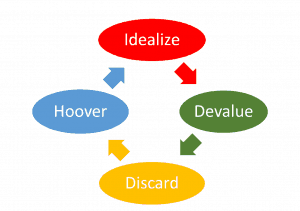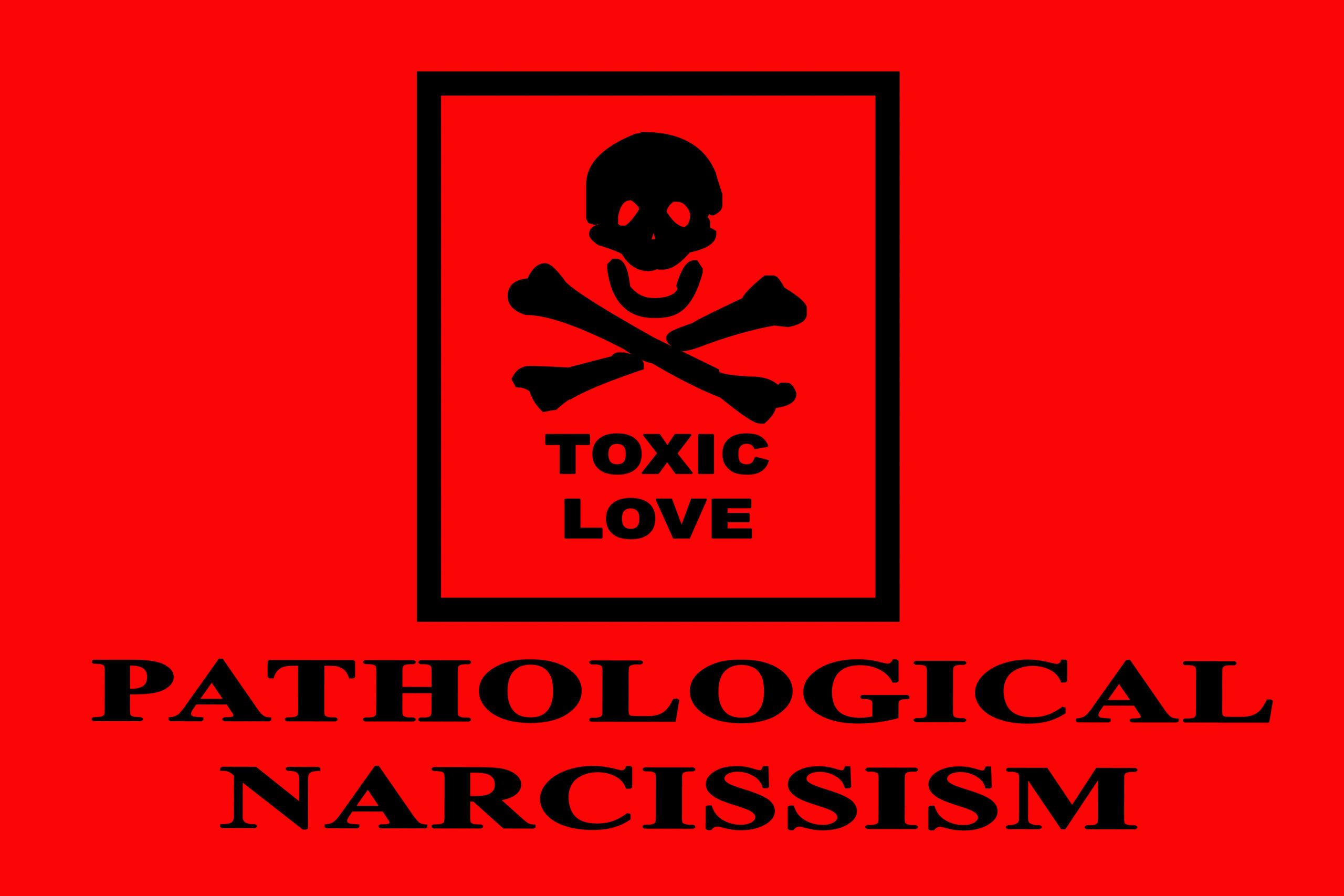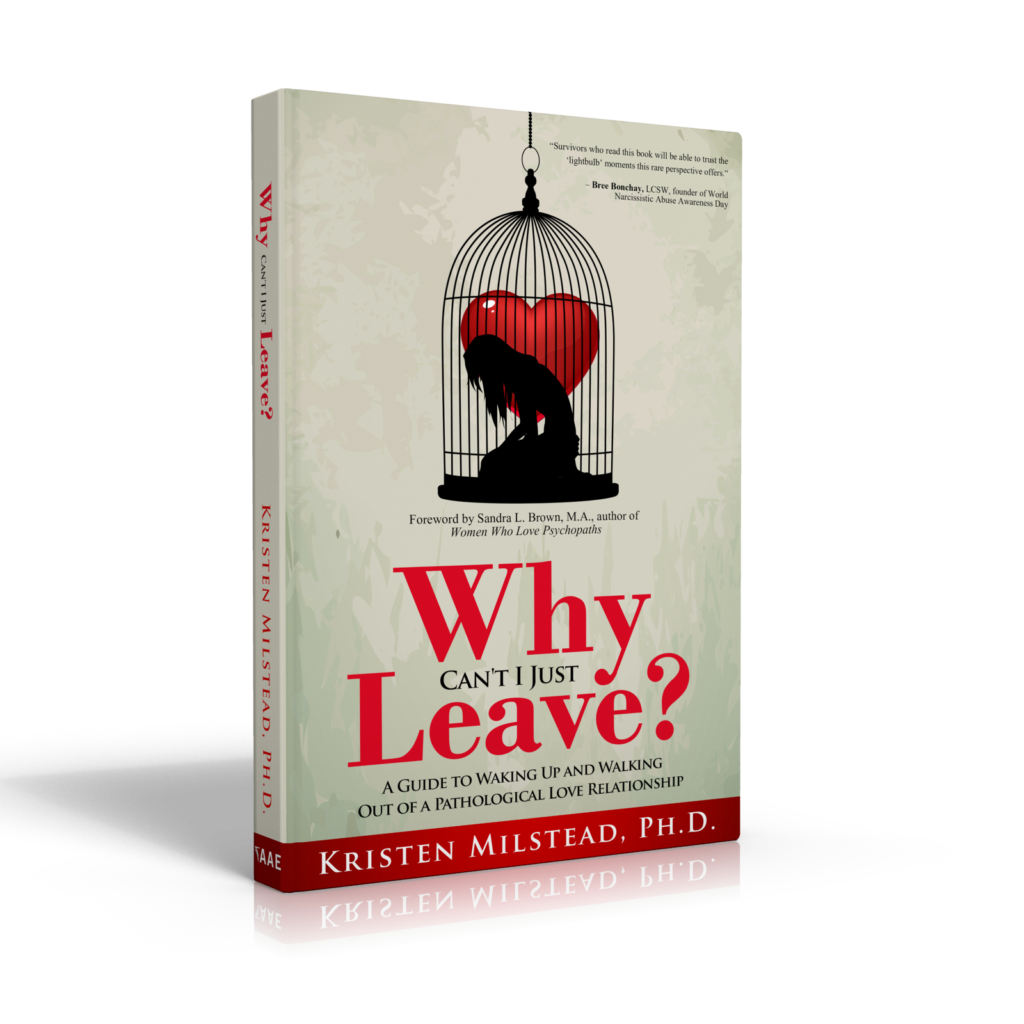How do they do it? How do narcissists walk away from their romantic relationships not only undamaged from them but with everyone around them either believing they are the “good guys or gals” while we are the ones left traumatized, shell-shocked for months or years by their emotional abuse?
They may even go on to torment us for years on end while they can still manage to make other people believe that they were the ones who were victimized.
Narcissists can get away with the things they do because they take advantage of cognitive psychological biases we all have and social norms we all share to further their own selfish ends.
For those closest to them, however, that can often mean taking the brunt of the damage.
The Four-Stage Narcissistic Cycle of Abuse

In many other articles, I have described at length the narcissistic abuse cycle, in which narcissists tend to blaze through four stages with their partners: idealization, devaluation, discard and hoovering. The narcissistic abuse dictionary states:
“Considered the cycle of abuse in narcissistic relationships, in the idealization at the beginning of the relationship, the narcissist puts his or her partner on a pedestal and showers them with excessive praise and attention. At some point, the narcissist will begin to see his or her partner as flawed or even grow bored and the devaluation begins. Many tactics characterize this phase, such as verbal abuse, withholding, humiliation, and smearing. Finally, when the narcissist no longer sees any value in the partner, perhaps if the partner has reacted in a way that the narcissist perceives negatively, such as demanding respect, the narcissist may discard the partner. The cycle often repeats many times before the relationship ends.”
The cycle repeats itself because after a discard, narcissists hoover partners back into entanglements with them using a variety of methods.
But how does the narcissist manage to maintain this control over us so that this cycle does play on seemingly endless repeat?
Explaining Narcissistic Abuse
To say that narcissists are doing things to get us there and keep us there in the relationship is an understatement. But those things themselves can be difficult to even put our finger on sometimes. Even when we can list some things they did, how do we explain the larger picture?
It is also true that there are many factors that may keep us there in the relationship. Those factors may include those outside the relationship before we got there and those inside the relationship that arose over time to make it difficult for us to leave. These, however, are not the abuse. They are conditions.
So what is it the narcissist actually does to us, and why can’t we ever focus on that?
When we try to talk about what narcissistic abuse is, we often end up describing:
- A handful of random tactics or incidents that are difficult to explain in their scope because the reason they were abusive was the fact that they were connected to one another over a long period of time. It’s the combined narrative of how the relationship unfolded that was so damaging, not an act here or an act there.
- The effects the abuse had on us. This doesn’t explain the narcissist’s role at all, and can, from an outsider’s point of view, make us appear potentially unreliable or unstable in our explanations of what happened since we are focusing on ourselves and can’t explain what the narcissist actually did.
- The pattern explained above. Yes, that is the pattern, but what behaviors did the narcissist exhibit within that pattern to abuse us and that can explain so much about why each stage was abusive and allowed it to repeat in the first place?
Three Components of a Narcissist’s Emotional Abuse (The DAM Model)
Narcissists may use physical, sexual, financial and more traditional forms of emotional abuse in relationships, but narcissistic abuse is a distinctive form of emotional abuse that is separate from all other types of abuse.
I believe that it is possible to group the things that they do into larger categories because narcissistic abuse is not a unique phenomenon. It’s compared to other forms of abuse–as it should be.
Because of its nature, however, it can be compared with many other types of criminal and exploitive behavior that exists, because we have the social psychological research that explains the principles that they have used to manipulate us into these types of relationships. It is just that the connection between this type of abuse and these other phenomena is only beginning to be made.
When we view narcissistic abuse using this framework, we can actually group the narcissist’s emotionally abusive behavior into three types.
Watch this video to learn more:
So think of the three types of emotional abuse as the DAM Model:
- Deception
- Authority/Domination
- Cognitive Manipulation
All three must be present in order for narcissistic abuse to occur.
Another way to think about it is that narcissists shift like chameleons to ensure their behavior fits the situation. So I like to think of the three components of their emotional abuse as roles the narcissist plays:
- The Savior
- The Punisher
- The Magician
The DAM Model Described in Detail
Through the use of deception, the establishment of authority/domination over their victims, and cognitive manipulation, narcissistic abusers are able to gain control over their victims and exploit them.
Deception
In a relationship with a narcissist, they use deception as a tactic to hide their true motives and intentions and who they really are.
This is done by intentionally presenting misinformation to the partner for the purpose of instilling love and trust. This takes the form of love-bombing and constructing a false persona for the partner to fall in love with: The Savior. The narcissist will hide other lives and aspects of his or her personality that would not fit with the persona that is needed to gain whatever is desired from the partner.
In turn, the partner makes himself or herself vulnerable and open to exploitation and is also more pliable to the other forms of emotional abuse.
Authority/Domination
The narcissist slowly begins to take over the partner’s life. This most closely resembles the devaluation phase of the relationship but extends beyond it. It is an overt form of behavioral control in which the narcissist presents oneself as either all-knowing or all-powerful or both to persuade or coerce the partner to bend to his or her will: The Punisher.
For example, the narcissist might monitor the partner’s behavior, make constant unfounded accusations, control access to resources, make devaluing comments to indicate that the partner doesn’t know anything, or create a situation in which the partner must ask for permission or depend on the narcissist for survival.
The purpose is to instill fear and dependence. The partner may fear what will happen if he or she leaves, but may also fear what will happen if the narcissist leaves.
“Authority and Domination” is the most recognized form of emotional abuse of the three described above. It is the most overt and most easily recognized.
Yet not all emotional abusers are narcissists. Narcissistic abuse extends beyond this type of control to a deceptive aspect and cognitive abuse that enables the narcissist to take control of the partner’s mind in a way that results in undue influence.
This is why it is important to distinguish between emotional abuse as we traditionally understand it (that is as it is defined in this sub-type) and the much broader form of emotional abuse we are defining as narcissistic abuse that includes this sub-type.
Cognitive Manipulation
Although all of this behavior by the narcissist is manipulative, cognitive manipulation as I’m using it here refer specifically to the use of a variety of underhanded (that is, invisible) tactics that the partner does not recognize to influence the partner’s thoughts or behavior. The partner often does not recognize that abuse has occurred.
The purpose of cognitive manipulation is to confuse and weaken the partner so that the partner is more easily exploitable. The narcissist uses tactics such as gaslighting, circular conversation tactics to project the problem onto the partner and avoid ever discussing the issues or taking responsibility, pathological lying, victimhood, encouraging the partner to give up treasured ideas and people from a more gentle perspective, and maneuvering back into The Savior role. This is the role of The Magician: the make the acts of The Punisher disappear.
When the narcissist uses cognitive manipulation, when the partner is confused, the partner is unable to clearly distinguish between the contradictory other roles of The Savior and The Punisher and make a clear decision that the narcissist is dangerous. The narcissist is able to replace doubts the victim may have about how he or she is being treated and with thoughts that will ensure the victim chooses to act in the best interest of the abuser instead.
The result is the stripping away of the personhood of the partner one small word or act at a time until the dominant will to act on his or her own behalf is erased.
Understanding the Larger Implications of the DAM Model
Deception, Authority/Domination, and Cognitive Manipulation are used as forms of emotional abuse in by a narcissist in relationships. They are narcissistic abuse. In other social contexts, however, one or more of these forms of control are the basis of other types of exploitation.
Narcissistic abuse is not just an individual problem–although it leads to individual destruction and devastation that can last for months, years or even a lifetime.
It is a social problem because these tendencies are everywhere. They’ve even been demonstrated week-by-week on a popular television series The Bachelorette.
Some of the same people who wreak this havoc in their personal lives have these same tendencies in other areas and may or may not carry them out.
From romance scams to cult abuse, false confessions to prisoners of war, the right conditions can put anyone at risk.
Don’t forget to check out these resources:






12 Comments
Done with Abuse
Thank you for this. I have been coming here daily for a while during the pandemic and it has been getting me through. I started EMDR recently (which is what brought me here), and have begun what I believe is the homestretch of leaving him. I have an 18-month-old after a decade-long marriage worth of losses, and I am more determined than ever to get the f- out of here and never come back. I used to be afraid to do all of the things I am doing now with some degree of ease. To anyone reading this wondering if will survive this–you CAN and WILL if you don’t give up! Don’t stop believing in Yourself and the one you have always been. If I can get to this place, anyone can. Though I am not out of the fog fully, I see the light at the other side and it is glorious. My sweet baby and me will start over anew, and find love together and within ourselves. Wishing everyone health, healing, and thriving. Cheers!
Susie Smith
Wow what a helpful post. You have given me much needed information. I have read several articles and none of them explain what has happened to me and how to cope with it like you describe here. Amazing thanks for caring enough to write it.
Terry
Excellent article! I never realized I was in such a toxic relationship. I was emotionally and financially abused. Unfortunately my ex won’t speak to two of our children because they have a relationship with me. He talks to the other two and they have a relationship with me too. Makes no sense. He trashes me to everybody including our kids. They are all adults. I divorced him last year. After 30 years of marriage!
Collette
Thank you Kristen….you go a long way towards helping me understand what was and to a lesser extent is still happening to me after 37 years of married life.
I consider myself an intelligent educated person but I failed to miss what was happening to me until it was nearly too late…..at first I rationalised the physical abuse as something I had done but as time went on and the abuse escalated to include financial, sexual and mental abuse and the violence amped up I knew I was in trouble. Even then it took me many months though before I could cry for help, however small that was. We had got very adept at hiding what was happening behind closed doors. I say we because I participated in the illusion as well… albeit to protect myself.
I escaped from my home a year ago now but the mental torment continues, the financial hardship is horrendous and occasionally there is still the physical abuse when I inadvertently come face to face with my former partner.
I wonder when it will all end, when will I get my life back? I know it won’t be the old me I get back but I long for the day when there is a “Me”
I continue to not sleep, I no longer fully believe in my abilities and have a fear of looking in the mirror because of the toll this has taken on me. I have lost friends and family and sometimes just the simple will to live. But then the sun breaks through and I’m glad of where I am, as hard as it is. I continue to read your articles and as I do, I understand more and the more I understand the further away I can move. Without the support of some wonderful friends new and old I wouldn’t be here today. They continue to support me, encourage me and endorse all I do…they grumble at me, push me, challenge me…..they love me and continue to try to get me to love me.
The journey will be long but I’m beginning to see a tiny glimmer on the horizon now, I can now say…..one that will continue to grow.
Cindy mayer
My traumatic divorce from the narcissist with the financial devastation and having to enforce the divorce agreement court order continues 12 years later. It’s hard to shake the consequences of a long term marriage with a narcissist. I’ve finally accepted that nothing will protect me short of death. I’m almost 54 and I can’t see a light at the end of the tunnel. I don’t have any contact. He continues to find ways to financially destroy me. The power and corruption of an intelligent narcissist when you are older and have children with them is truly infinite. He was my provider for 25 years and I wish there was help. It’s not an emotional situation. It’s a issue of how they continue to hurt, be in contempt of court and Influence the legal system as mine is fairly predominant in the area.
Bob
Very good work Kristen like always. this DAM model is complicated internally yet simplified into the categories, one of the most important parts is not being aware of it happening, after becoming aware and with some time of being aware an still in it, it’s more easily recognizable. As for the N recognizing they are doing this is a question, I feel that my N is not capable of thinking this strategy, but dose it very well and has being for a long time. Nature or nurture ? it don’t matter anyway it’s being done. And don’t even try to explain or change any of this with the N, I tried for over a decade thinking I could change things.
Cindy I have to comment on your older adults thought, at 64 I feel that we or I am more easily adaptable to change or starting over, cause of the many changes life has thrown at us, that we have endured and recognizing that we only have so much time to make hard decisions. To look at the months or longer road ahead to healing an rebuilding is the hardest task. Maybe that’s just me I’m a builder by trade, getting used to taking time for things to come to fruition. The old saying Rome wasn’t built in a day.
Kristen I’m hoping you will think about an write for the older adult, I’ve looked everywhere and as far as N relationships go late life awakening to N abuse seems to be a neglected subject.
Silver splitters grey divorce don’t cover this type of situation.
Never give up
Bob
Carol
This is PERFECT!!! Thank you so much for laying it out. Fantastic article, which I will keep with your many others.
Debra A Finley
Kristen, i just want to thank you from the bottom of my heart.If it wasnt for you and your free blog and resources, i would never have been able to move forward in my healing.I know it will take me a long time to heal but you are such a blessing.Thank you.
Carol
Debra-the narcissist is not where your story ends. If you once gave it all to the narcissist, you can now honot yourself by giving your all to you. Hold steady. You are not alone. KEEP GOING!
Debra A Finley
Yes Carol, you are so right.I will heal and Iam moving forward slowly.Baby steps.Thank you and God Bless you.
Cindy
Brilliant! Yes difficult to describe and easily missed until it’s been experienced long term. This is the danger. Even very educated and wise people may not recognize it as dangerous as it is. We must overlook the idiosyncrasies in people in order to have relationships. These sneak up slowly and see mitigate my good behavior in between. It’s a slow cocktail of cruelty and abuse that sneaks up on even the most astute person. By the time we figure it out, we invested much, we are wheeling and are trying to make sense of the patterns we begin to recognize. Often explored at this point not to mention the damn trauma bond. This is a serious epidemic. It has lifelong effects even if you heal you can never fully recover especially if your older. It takes a lot of time and staring over isn’t always an option for older adults. It isn’t just for people who were previously abused as a child. People who has healthy relations is can get bamboozled too it the narcissist is high functioning and not physically abusive. Anyone can. Be a victim. You are tackling this better than anyone I every read. Even Sandra Brown the women who love psychopaths author. You got her beat!!
Amanda
‘Slow cocktail of cruelty and abuse … ‘
Perfectly sums it up .. thank you … I’ve written this down and pinned it to my wall in the kitchen .. I will remind myself of this everyday to help me maintain NC. It’s so hard to get through .. but I know in my heart it’s the only way forward.